 W
W2000 AD is a weekly British science fiction-oriented comic magazine. As a comics anthology it serialises stories in each issue and was first published by IPC Magazines in 1977, the first issue dated 26 February. Since 2000 it has been published by Rebellion Developments.
 W
WAction was a controversial weekly British children's anthology comic that was published by IPC Magazines, starting on 14 February 1976, until November 1977.
 W
WAction Man was a UK comic book series published by Panini Comics, based on the toy line of the same name. It ran for 138 issues between 1996 and January 18, 2006 before being surpassed by spin-off series Action Man: A.T.O.M.. The comic was originally published every month, but this was later changed to every three weeks. The final editor was Ed Caruana, with previous editors including Rob Jones.
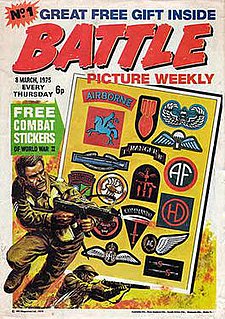 W
WBattle Picture Weekly, at various times also known as Battle Action, Battle Action Force, Battle and Battle with Storm Force, was a British war comic book magazine published by IPC Magazines from 8 March 1975 to 23 January 1988, when it merged with the new incarnation of Eagle. Most stories were set in World War II, with some based on other conflicts.
 W
WBullet was a comic book published weekly in the UK during the 1970s.
 W
WBuster was a British comic which began publication in 1960, originally published by IPC Magazines Ltd under the companies comic division Fleetway, then by Egmont UK Ltd under the same imprint until its closure in 2000. Despite missing issues due to industrial action during its run, the comic published 1,902 issues in total. The comic carried a mixture of humour and adventure strips, featuring the title character Buster and a host of other characters.
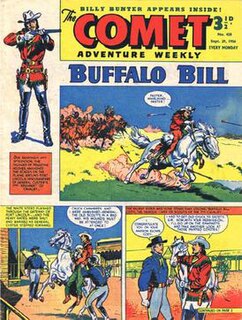 W
WThe Comet was a British comic magazine, launched by Cheshire-based publisher J. B. Allen on 20 September 1946. When the publisher was taken over by the Amalgamated Press in May 1949, Leonard Matthews was appointed editor and exchanged the paper's customary humour strips for adventure ones like "Battler Britton", "Billy the Kid", "Robin Hood", "Kit Carson", "Dick Turpin" and "Jet-Ace Logan". It continued publishing until 17 October 1959, when it was merged into Tiger.
 W
WComics International was a British news and reviews magazine about comic books. Founded in 1990, it was published monthly by Quality Communications until 2006. At the time of its demise in 2010, it was published by Cosmic Publications Ltd. Comics International was given the National Comics Award for Best Specialist Comics Publication four times in six years.
 W
WCommando For Action and Adventure, formerly known as Commando War Stories in Pictures, and colloquially known as Commando Comics, is a British comic book magazine that primarily draw its themes and backdrops from the various incidents of the First and Second World Wars. It was first published in July 1961 and is still in print today. It is noted for its distinctive 7 × 5½ inch, 68 page format that became a standard for these kinds of stories. "Commando" has remained more popular than many other British war comics, because of its character based stories and detailed black and white artwork, with only the covers in colour.
 W
WCor!!, a British comic book, was launched in June 1970 by IPC, their sixth new comic in just over a year. Cor!! was edited by Bob Paynter.
 W
WThe Dandy was a British children's comic magazine published by the Dundee based publisher DC Thomson. The first issue was printed in December 1937, making it the world's third-longest running comic, after Il Giornalino and Detective Comics. From August 2007 until October 2010, it was rebranded as Dandy Xtreme.
 W
WThe DFC was a weekly British children's anthology comic, published by David Fickling Books. The first issue was published at the end of May 2008. The title stood for "David Fickling Comic". Its successor, The Phoenix, launched on 7 January 2012.
 W
WDiceman was a short-lived British comic which ran for five issues in 1986. It was a spin-off from 2000 AD and was devised by Pat Mills, who also wrote almost all of the stories. It was edited by Simon Geller, but purported to be edited by a monster called Mervyn. The stories were designed to be played like gamebooks. Each issue contained two or three such stories and was published every two months.
 W
WDoctor Who Magazine is a magazine devoted to the long-running British science fiction television series Doctor Who. Launched in 1979 as Doctor Who Weekly, the magazine became a monthly publication the following year. Now with 13 issues a year, as well as currently producing triannual deluxe Special Editions (2002–) and Bookazines (2013–), the publication features behind the scenes articles on the TV show and other media, as well as producing its own world famous comic strip. Its founding editor was Dez Skinn, and the incumbent editor is Marcus Hearn, who took over from the magazine's longest-serving editor, Tom Spilsbury, in July 2017. DWM is recognised by Guinness World Records as the longest running TV tie-in magazine, celebrating 40 years of continuous publication on 11 October 2019.
 W
WEagle was a British children's comics periodical, first published from 1950 to 1969, and then in a relaunched format from 1982 to 1994. It was founded by Marcus Morris, an Anglican vicar from Lancashire. Morris edited a Southport parish magazine called The Anvil, but felt that the church was not communicating its message effectively. Simultaneously disillusioned with contemporary children's literature, he and Anvil artist Frank Hampson created a dummy comic based on Christian values. Morris proposed the idea to several Fleet Street publishers, with little success, until Hulton Press took it on.
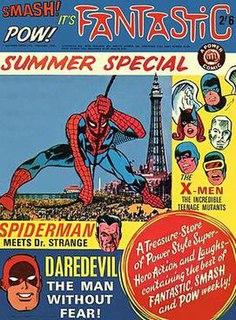 W
WFantastic was a weekly British comic book magazine published by Odhams Press under the Power Comics imprint. It first appeared on 18 February 1967, and with its 52nd issue on 10 February 1968 it merged with its sister title Terrific. The 89th and final issue of Fantastic appeared on 7 September 1968, after which it was merged into Smash!.
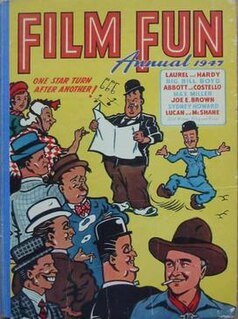 W
WFilm Fun was a British celebrity comics comic book that ran from 17 January 1920 to 15 September 1962, when it merged with Buster, a total of 2225 issues. There were also annuals in the forties and fifties. It was renamed Film Fun and Thrills in 1959. As the title suggests, the comic mainly featured comic strip versions of people from films from the 1920s to the 1960s. Pre-war circulation at its peak was around 800,000 copies per week.
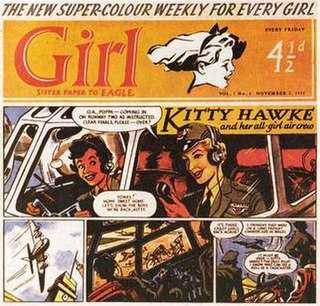 W
WGirl was a weekly comic magazine for girls published from 1951 to 1964. It was launched by Hulton Press on 2 November 1951 as a sister paper to the Eagle, and lasted through Hultons' acquisition by Odhams Press in 1959 and Odhams' merger into IPC in 1963. Its final issue was dated 3 October 1964, after which it was merged into Princess. Another comic of the same name was published by IPC from 1981 to 1990, during which time Dreamer and Tammy were merged into it. Girl was very much an "educational" magazine whose heroines, including those who got into scrapes, became involved in tales which had a moral substance. A considerable number of pages were also dedicated to real life tales of heroic women in various fields.
 W
WThe Hotspur was a British boys' paper published by D. C. Thomson & Co. From 1933 to 1959, it was a boys' story paper; it was relaunched as a comic in October 1959, initially called the New Hotspur, and ceased publication in January 1981.
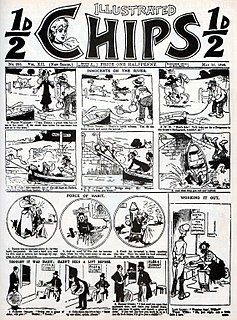 W
WIllustrated Chips was a British comic magazine published between 26 July 1890 and 12 September 1953.
 W
WJinty was a weekly British comic for girls published by Fleetway in London from 1974 to 1981, at which point it merged with Tammy. It had previously merged with Penny in a similar fashion, illustrating the 'hatch-match-dispatch' process practiced by editorial staff in the London comics publisher.
 W
WKnockout may refer to one of two British comics.
 W
WKrazy was a British comic book magazine published every Monday by IPC Magazines Ltd. It ran from 16 October 1976 to 15 April 1978, when it merged with stable-mate Whizzer and Chips. In 1977, one of the characters in the comic, Cheeky, proved popular enough to get his own comic, Cheeky, which was later merged into Whoopee!. The comic included a "disguise" back-cover, such as the cover of a diary or brochure, which allowed readers to hide the comic from parents or teachers.
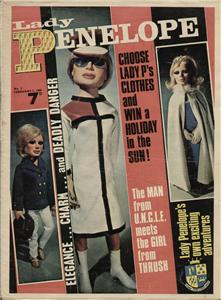 W
WLady Penelope was a British weekly comic book magazine for girls which ran from 1966 to 1969. The title character was based on Lady Penelope Creighton-Ward, the secret agent seen in the television series Thunderbirds. Most of the other strips in the comic were also based on popular television shows of the era.
 W
WLook and Learn was a British weekly educational magazine for children published by Fleetway Publications Ltd from 1962 until 1982. It contained educational text articles that covered a wide variety of topics from volcanoes to the Loch Ness Monster; a long running science fiction comic strip, The Trigan Empire; adaptations of famous works of literature into comic-strip form, such as Lorna Doone; and serialized works of fiction such as The First Men in the Moon.
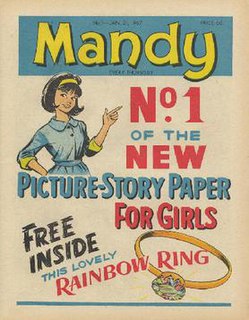 W
WMandy was a British comic book magazine for girls, published weekly by D. C. Thomson & Co. from 21 January 1967 (#1) to 11 May 1991 (#1,269), with annuals appearing from 1972 until 2007.
 W
WMonster Fun was a weekly British comic strip magazine for children aged seven to twelve. Published by IPC Media, it ran for 73 issues in 1975–1976, when it merged with Buster. Focused on humorous monster strips and stories, the magazine was known for "The Bad Time Bedtime Books" minicomic inserts, created by Leo Baxendale.
 W
WOink! was a British comic book magazine for children which was published from 3 May 1986 to 22 October 1988. It set out to be deliberately anarchic, reminiscent of Viz but for children. The creators also cited Mad magazine as a major influence.
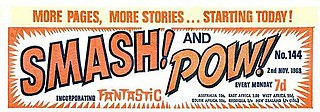 W
WPow! was a weekly British comic book published by Odhams Press in 1967 and 1968 from their headquarters at 64 Long Acre, London. Part of their Power Comics imprint, it was printed on newsprint stock, in black-and-white except for its colour front and back covers, and initially comprised 28 pages.
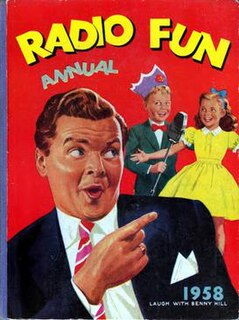 W
WRadio Fun was a British celebrity comics comic paper that ran from 15 October 1938 to 18 February 1961, when it became the first out of twelve titles to merge with Buster. By this time it had been renamed to Radio Fun and Adventure. The comic strips included the uncredited work of industry regulars such as Roy Wilson and George and Reg Parlett. The format of the humorous strips was to pack in as many gags and slapstick situations as possible. The comic mainly featured comic strip versions of radio and film stars, including:Arthur Askey Benny Hill Bernard Bresslaw Charlie Chester Petula Clark Charlie Drake Clark Gable Tommy Handley Jimmy Jewel and Ben Warriss Tom Keene Sandy Powell Jack Warner Norman Wisdom
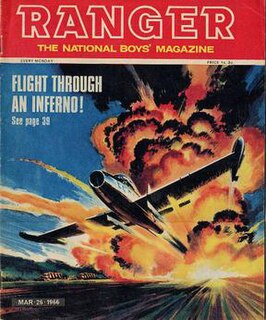 W
WRanger was a British comic book magazine, with occasional printed stories, published by Fleetway Publications for 40 un-numbered issues between 18 September 1965 and 18 June 1966. The title was then incorporated into Look and Learn from issue 232, dated 25 June 1966.
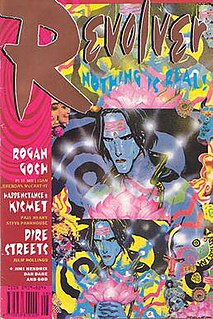 W
WRevolver is the title of a short-lived British comic book magazine published by Fleetway Publications in the early 1990s. Founded by Steve MacManus and edited by Peter Hogan, Revolver was a spin-off from 2000AD. Revolver attempted to take advantage of the 1960s revival which was sweeping British culture in the early 1990s, including the explosion of the British music scene at the time.
 W
WSmash! was a weekly British comic book, published in London by Odhams Press Ltd from 64 Long Acre and subsequently by IPC Magazines Ltd from (initially) 189 High Holborn and (latterly) Fleetway House in nearby Farringdon Street.
 W
WSonic the Comic was a British children's comic published by Fleetway Editions between 1993 and 2002. It was the UK's Sega comic, featuring stories about its mascot Sonic the Hedgehog and related characters, as well as comic strips based on other Sega video games, along with news, reviews, and tips for games released for Sega systems.
 W
WStarblazer - Space Fiction Adventure in Pictures was a British small-format comics anthology in black and white published by D. C. Thomson & Co. Ltd.
 W
WStarlord was a short-lived weekly British science fiction comic book magazine published by IPC in 1978 as a sister title to 2000 AD, which had been launched the previous year in anticipation of a science fiction boom surrounding Star Wars.
 W
WSwift was a British weekly comics magazine published by in the UK as a junior companion to the Eagle. It was founded by the Rev. Marcus Morris and launched by Hulton Press in 1954. After Hultons were sold to Odhams Press in 1959, Swift was merged into the Eagle in 1963.
 W
WTerrific was a weekly British comic published by Odhams Press' Power Comics imprint in 1967–1968. Terrific was similar in format to its sister title Fantastic, which had started publication two months earlier. The two titles were quite unlike other British comics of the time, consisting mainly of material reprinted from American Marvel Comics. In this respect they can be considered a precursor of the Marvel UK weeklies, such as The Mighty World of Marvel, that appeared during the 1970s.
 W
WThriller Comics, later titled Thriller Comics Library and even later Thriller Picture Library, was a British comic book magazine, published in series of digest sized issues by the Amalgamated Press, later Fleetway Publications, from November 1951 to May 1963: 450 issues in all, originally two per month, later four.
 W
WThe Topper was a UK comic published by D. C. Thomson & Co. Ltd that ran from 7 February 1953 to 15 September 1990, when it merged with The Beezer.
 W
WTwinkle, 'the picture paper specially for little girls' was a popular British comics magazine, published by D. C. Thomson & Co. Ltd from 27 January 1968 to 1999. It was aimed at young girls and came out weekly, supplemented each year with a Summer Special and a hardcover Annual.
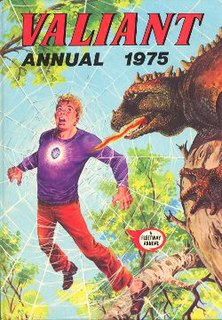 W
WValiant was a British boys' adventure comics anthology which ran from 1962 to 1976. It was published by IPC Magazines and was one of that company's major adventure titles throughout the 1960s and early 1970s.
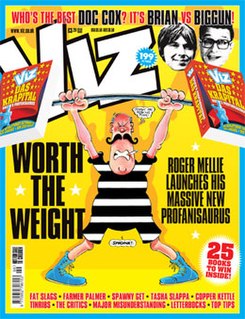 W
WViz is a popular British adult comic magazine founded in 1979 by Chris Donald. It parodies British comics of the post-war period, notably The Beano and The Dandy, but with vulgar language, toilet humour, black comedy, surreal humour and generally sexual or violent storylines. It also sends up tabloid newspapers, with mockeries of articles and letters pages. It features parody competitions and advertisements for overpriced 'limited edition' tat, as well as obsessions with half-forgotten kitsch celebrities from the 1960s to the 1980s, such as Shakin' Stevens and Rodney Bewes. Occasionally, it satirises current affairs and politicians, but it has no particular political standpoint.
 W
WWar Picture Library was a British 64-page "pocket library" war comic magazine title published by Amalgamated Press/Fleetway for 2103 issues. Each issue featured a complete story, beginning on 1 September 1958 with "Fight Back to Dunkirk" and finishing 26 years later on 3 December 1984 with "Wings of the Fleet". The editor was Ted Bensberg. Assistant editors included Geoff Kemp and Brian Smith. Other editorial staff included Pat Brookman, Terence Magee, Clive Ranger, Tony Power and Clive McGee. Art editor was Mike Jones and art assistant was his brother Dave Jones. Other art assistants at various times were Roy McAdorey, Geoff Berwick, Bill Reid and John Fearnley.
 W
WWarlord was a comics anthology published weekly in the United Kingdom between 28 September 1974 and 27 September 1986.
 W
WWhizzer and Chips was a British comics magazine that ran from 18 October 1969 to 27 October 1990, when it merged with the comic Buster. As with most comics of the time, Whizzer and Chips was dated one week ahead of the day it actually appeared on newsstands in Great Britain. It had no relation to earlier British comic Illustrated Chips.
 W
WWow! is a British comic book magazine running for 56 issues from 5 June 1982 to 25 June 1983, when it merged with Whoopee!.